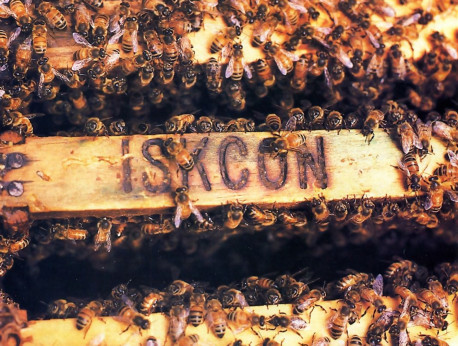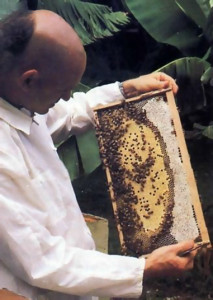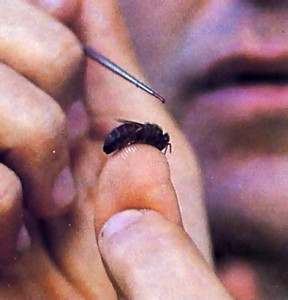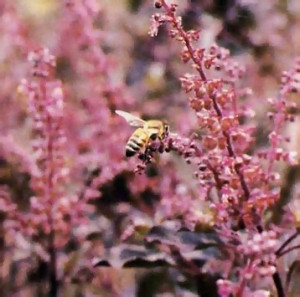A swami from Miami harvests honey in Hawaii.
by Narahari Swami


Several times a week at the Hare Krsna center in Honolulu, I set aside my staff and formal monk’s dress, don a full-coverage white suit, light up my smoker, and begin one of my favorite spiritual meditations—taking care of Lord Krsna’s honeybees.
Who would ever have suspected that beekeeping could be a totally transcendental form of yoga and meditation? Frankly, I never did until one day about eight years ago a devotee came running into our Miami temple screaming, “The temple is being invaded by a huge swarm of bees!” Alarmed, I peeked through the window. Sure enough, there they were: thousands and thousands of bees filling the air like a great dark cloud. I don’t remember exactly what impelled me to do what I did next, but for some reason or other I cautiously walked outside, stood right in the middle of the buzzing cloud, and thought, “Krsna must have sent these bees so we could engage them in His service.”

Within a few minutes the bees had clustered like a large football on the eaves of our building. Not knowing what to do, I quickly drove off to a farm supply store and asked the owners how I could catch our swarm of bees and what supplies I would need to cultivate honey from them. A knowledgeable fellow outlined the procedure and then sold me all the supplies I needed.
Off I went. But by the time I got back to the temple all the bees were gone. Undeterred, I started calling all over town to find some bees to fill Krsna’s first hive. I discovered many local beekeepers more than willing to help us get started.

Now, some eight years and thirty hives later, I can look back and see why Krsna arranged to start a beehive at His temple. In the Age of Kali, the Age of Quarrel and Hypocrisy, Lord Krsna comes in an especially merciful form. Lord Caitanya, and indiscriminately gives His mercy to all the conditioned souls by engaging them in His service. So why not bees? They can produce honey, a wonderful sweetener for food offered to Krsna, as well as clean-burning wax for candles used in worship of the Deity form of the Lord. In the hive the bees also make substances with great medicinal value, which have been used for literally tens of thousands of years.

In Hawaii, where honeybees can work throughout the year, a hive may house from forty-five thousand to seventy-five thousand bees at a time. Each hive has one queen and about a hundred male bees, the drones. The rest are sterile females, the workers. The queen and the drones may live for a few years, but the workers live only about seven weeks.

So in each hive, nearly a half million bees can offer their services to Krsna every year. This service will in their next life elevate them to the human form, and thus they will be saved from having to enter literally millions of other life forms. And as human beings, the souls who in their last life inhabited the bodies of bees will continue their devotional service to Krsna.
We have practical experience that bees who work for Krsna are generally more gentle and productive than other bees. The bees at our center in Honolulu produce well over two tons of honey each year. Our temple kitchen and wholesale bakery use most of it. We bottle what’s left and, after offering it to Krsna, sell it in our temple store and in local health-food stores.
Recently, Honolulu hosted the annual convention of the American Beekeepers Association. Many commercial beekeepers came to town, and one well-seasoned professional from Canada met our devotees in Waikiki, where he accepted an invitation to come to our center and see our bees. Eager to learn some new techniques from him, I asked him to work through our hives with me. He agreed, and as we began working he was amazed at how enthusiastic and well-behaved our bees were. He’d never seen anything like it.

Each time I work through Krsna’s hives, Krsna seems to reward me with a new transcendental realization. For example, recently I saw that honeybees clearly display the spirit soul’s eternal nature: to serve, honor, and love. The original nature of all beings is to reciprocate with Krsna in His unlimitedly sweet loving affairs. But when the spirit soul comes in touch with material nature, he misdirects his love. In the beehive, all the bees serve, honor, and love the queen. If for some reason the hive becomes queenless, all the bees become anxious and will do little or no work. In the queen’s presence, however, the bees work feverishly and almost never turn their back to her. Special attendants feed her and massage her body. When a new queen is hatching, the workers decorate her cell in anticipation.

Like most queens, the queen bee is very vain. If for some reason there is more than one queen in the hive, as soon as they see each other they will battle to the death. Even newborn queen bees are murderously vain. Generally, when the workers are hatching out a new queen, several other queen cells are growing nearby. As soon as the first queen hatches, she eats something and then proceeds to tear apart all the other queen cells and sting the larvae to death. (Interestingly enough, only the queen can sting more than once.)
Another fascinating thing is that although no one bee is designated as the “hive commander” or “hive coordinator,” the complex hive flourishes harmoniously. There are nectar collectors, pollen collectors, water collectors, nurses, chemists, scouts, wax makers, ventilators, guards, cleaners, carpenters, and undertakers. And sometimes, when honey is scarce, a gang of bees will raid other hives.
How all this goes on so smoothly has baffled beekeepers as far back as their records date. As for myself and the devotees I work with, however, there is no mystery in the beehives. As Lord Krsna explains in the Bhagavad-gita, He sits within the hearts of all living entities and directs their actions. Krsna is working wonderfully, guiding all the bees as they work to produce their honey. It is also Krsna who creates the varieties of flowers that attract the bees to come and collect nectar and pollen. And all this is part of Krsna’s plan for bees to assist in the pollination and cross-pollination of various plants.
Sometimes I feel like I could go on forever relishing the many wonders going on in Krsna’s transcendental beehives. Then I remember that Krsna says, “This is all but a tiny spark of My splendor.” And I reflect on the real honey that I and the devotees who work with me can harvest from Krsna’s hives—pure, unmotivated love of God.

interesting story although you do not mention the Canadian Apiarist that attended to your meeting .. per chance is it my Godbrother HG Sanat Kumara Prabhu from Cariboo Mountains at Saranagati near Ashcroft .. as he is the only lifelong Keeper i know personally having done so for pleasure ofcHis Divine Grace Srila Prabhupada.. !
ys
gopijana dasa